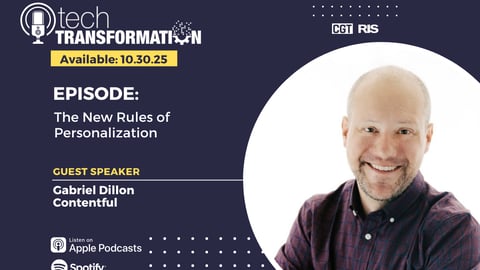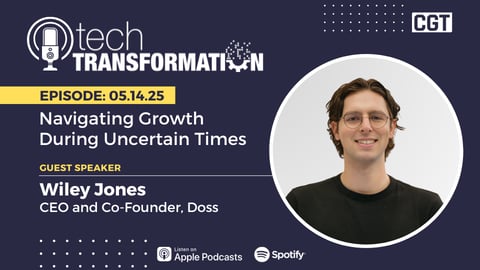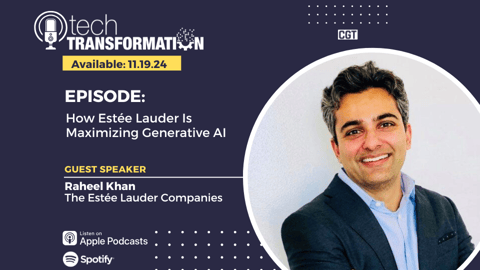Tech Transformation Podcast: Kellogg’s Charisse Hughes and Lesley Salmon On DTC, Data & All Things Analytics
When you’re one of the largest CPGs in the world, understanding consumers has become more important than ever. For The Kellogg Company, this means leaning into such technologies as artificial intelligence and machine learning, and connecting the dots between their data across all channels.
In this episode of Tech Transformation, CGT Senior Editor Lisa Johnston talks with Charisse Hughes, SVP and Chief Brand and Advanced Analytics Officer, and Lesley Salmon, SVP and CIO of Kellogg Company, about what they’re seeing when it comes to today’s consumer behavior changes and how they’re using data and technology to prepare for the consumer of tomorrow.
Listen to learn:
- How Kellogg is preparing for the consumer of 2035
- What personalization means to Kellogg and how it prevents it from becoming a buzzword
- Where it sees the future of DTC and CPG commerce
- Where it’s using artificial intelligence and machine learning
- The consumer data that’s important to Kellogg
Subscribe
Excerpts
Personalization
Hughes: “We have instituted and created a single source of truth to understand our service and store performance. We're using internal data [such as] shelf availability and on-time and case-fill rates, and then marrying that with external data like shelf audits and third-party sales data. And what we've been able to do is build a proof-of-concept internally, which is a rapid, iterative process with our data scientists, engineers, and functional leaders. Now our account teams have that single source of truth, and we've leveraged that information and the visualization of it to identify availability gaps and opportunities.
“Now that we've completed this first phase, we're moving on, and we're going from descriptive and diagnostic analytics to more predictive analytics. Phase two will have even more analytics and data included, and this will allow us to do things like predict forecast accuracy, have personalized and suggestive selling, [and] substitutions for out-of-stocks.
“Our next phase after that is plugging in the marketing so that we can automatically redeploy our marketing dollars to those areas or channels that have food available vs. spending dollars in places where we know we may have potential gaps in our availability.”
Direct-to-Consumer
Salmon: “From a back-end perspective, one of the critical things for us is looking to standardize as much as possible in our DTC efforts. And the more we can have a common back end, the more it allows me to drive efficiency and effectiveness across my IT function. And in turn, that means we can also drive speed and agility — that is really, really important from a personalization perspective. It also allows us a common approach to data, and the more common approach we can have to that data, the more opportunity we have to drive value from it.”
Hughes: “We're actually in beta on a platform called Antenna, which is using the capabilities in terms of DTC backbones. And so what we're doing is personalizing food innovation. We're doing that at scale, but directly with consumers and in line with our purpose around creating a seat at the table — but also our commitment to equitable access to food.
“This platform leverages a value exchange for data with consumers, and we actually reward our participants through meal donations to organizations within their community. So when the consumer logs on, they enter and they're greeted by Tony the Tiger, an animated bot. And then from there, we're able to test dozens of food concepts using the AI engine. One of the things that's really important about this engine is that we're able to segment consumer cohorts and make sure that we're capturing diverse audiences across preferences and characteristics, and that we're really driving an AI engine that minimizes bias, which is really important and at the core of our company.”
Consumer Data
Hughes: “We've had Kellogg's Family Rewards for 10 years, so we were at the forefront in terms of acquiring consumer data. And that continues to be a core foundation of our data strategy. But we're also getting behavioral data, we're doing social listening, of course, transactional data, location data — all of those pieces help to dimensionalize our consumer, and we're using that data across a variety of different platforms and different means. …
“We had a really cool initiative that we did with Eggo at daylight saving time where we wanted to acquire first-party data. So we did it with an Eggo waffle giveaway that actually featured Nick Lachey and communicated across a host of different channels. We were able to get 100,000 first-party data records, and that was generated in less than three hours, which is unprecedented.”
Consumer Behavior Trends
Salmon: “In 2035 and beyond, the retail environment will fit the needs of every individual shopper, so really putting the person into personalization. Shoppers will see the personalization of products in their own shopping journey as a baseline expectation to fit their unique attitudes and needs. And traditional offline and online channels will become increasingly integrated with one another, supplemented with artificial intelligence and innovative technologies to really offer data-driven capabilities. Technology is the backbone of that, and it ensures we'll be able to achieve those expectations.”
Hughes: “Shoppers will become more complex; they will be more diverse and will actually live longer, so we'll have to appeal to a larger and larger aging population. … Place is now everywhere. So it's online, it's offline, it’s virtual, it’s IRL. We have to understand and be focused on the retail spaces of the future and making sure that we're engaging consumers and being personalized. And in fact, on Monday, I have 200 marketers from around the world that will be joining me for a summit on the metaverse and how to think about the metaverse for our company.”
Overcoming Information Silos
Salmon: “Charisse and I have partnered to host quarterly internal data summits. We bring various functions together to educate our commercial teams on how we're using advanced data and analytics, and to really further connect the dots and turn the insights that we find into actions that drive growth for the business. By combining our insights and analytics capabilities with innovation and e-commerce and other elements, we can provide really rich omnichannel experience to ensure that we've got the right foods, the correct pricing, and they're tailored to the right messages to our diverse set of consumers.”
Subscribe
Tech Transformation Video
More of a video person? Click here to watch a high-level overview of the conversation, and watch more Tech Transformation videos!








